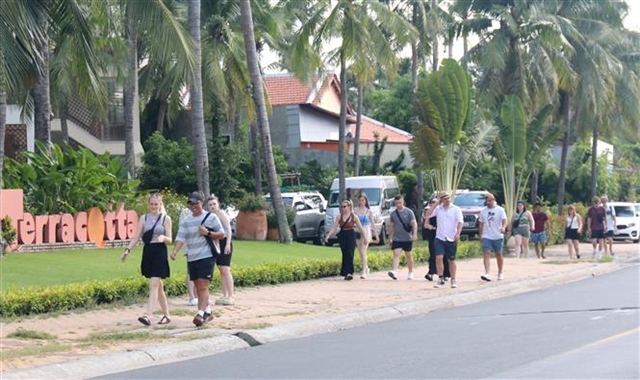Starting from August 15, the updated laws for Vietnamese citizens' exit and entry, as well as for foreigners' entry, exit, transit, and stay in Việt Nam, will bring important changes to the rules for visas and how long visitors can stay.

With more lenient visa regulations and extended stays for international visitors, promising prospects emerge for the impending peak tourism season of tourism in Việt Nam.
Starting from August 15, the updated laws for Vietnamese citizens' exit and entry, as well as for foreigners' entry, exit, transit, and stay in Việt Nam, will bring important changes to the rules for visas and how long visitors can stay.
One key change is that tourists with electronic visas (e-visas) will now be allowed to stay for up to 90 days, instead of the previous 30 days. This means they can enter and leave Việt Nam multiple times within those 90 days, without needing to apply for a new visa each time. Also, citizens from countries that Việt Nam allows to enter without visas will now be allowed to stay for up to 45 days, up from the previous 15 days. The rules for issuing and extending visas will follow the established guidelines.
Việt Nam's National Tourism Administration, part of the Ministry of Culture, Sports, and Tourism, together with experts in tourism, believe that these positive changes will greatly help the growth of Việt Nam's tourism. More visitors from other countries are expected to arrive, which could lead to exciting investment opportunities.
In the first seven months of 2023, almost 6.6 million tourists visited Việt Nam, close to the goal of 8 million for the whole year. More growth is expected during the busy year-end season.
A spokesperson from Agoda, an online travel platform, reported a substantial surge of 33 per cent in searches for information about Việt Nam's visa renewal policy among international visitors during the two weeks following the National Assembly's approval of the new regulations.
Leading this surge, visitors from France have shown remarkable enthusiasm, driving a 72 per cent increase in demand for accommodations in Việt Nam compared to two weeks ago. Likewise, tourists from the Netherlands, New Zealand, Germany, and the United States have exhibited a notable rise of 38-45 per cent in their interest towards Vietnamese tourism.
Nguyễn Thanh Sơn, Deputy Director of Benthanh Tourist International Centre, said that the company had reached out to several partners in key markets such as Romania, the Netherlands, Germany, France, and the US to inform them about Việt Nam's new visa policy.
All partners had received this news with great enthusiasm, he said.
However, Sơn said tourist companies were all waiting for detailed guidelines before collaborating with their partners to devise new travel itineraries, rejuvenate our offerings, and embark on marketing initiatives to attract tourists.
Cao Trí Dũng, Chairman of the Board of Directors at Việt Nam TravelMart Joint Stock Company said that the new visa policy endorsed by the National Assembly would bring about a fundamental transformation in the profile of guests and the service infrastructure within the tourism sector.
The trend would exert an influence on the service system, necessitating adjustments to align with the novel policy. The policy, in turn, would create favourable circumstances to enhance the overall competitiveness of Vietnamese tourism, as well as localities, in tapping into international visitors.
According to Nguyễn Trùng Khánh, Director of the Vietnam National Tourism Administration, while the more lenient visa policy is important, it alone cannot fully enhance Việt Nam's appeal to tourists, improve its competitiveness, and captivate international markets. Achieving these goals requires a coordinated approach involving a range of complementary solutions.
The industry as a whole should prioritise crafting unique and appealing tourism products, complemented by robust marketing and promotional initiatives targeted at key markets.
Employing systematic and professional strategies to harness substantial potential is essential. Ensuring effective destination management, particularly in terms of security and safety, plays a pivotal role in delivering a positive experience to travellers exploring the country.
Concurrently, collective efforts are necessary to train tourism personnel, aligning with the demands for both quantity and quality, thereby elevating service standards to cater to diverse visitor needs. Furthermore, the widespread integration of digital transformation and information technology within tourism operations must be advanced in a harmonised manner.
Careful attention should be given to all policies that contribute to enhancing the overall travel experience in Việt Nam.
Considering the current rate of growth, the tourism industry necessitates an annual infusion of 40,000 fresh employees, in addition to retraining 25,000 individuals. However, educational institutions presently only graduate 20,000 students per year.
The proportion of proficiently trained personnel within the tourism sector remains inadequate, encompassing merely 43 per cent of the total workforce, with almost half displaying a lack of competence in foreign languages.
Conversely, the skill level of tourism workers in Việt Nam lags behind that of other nations. Notably, hotels in Việt Nam exhibit significantly lower productivity than their counterparts in destinations such as Singapore, Japan, and Malaysia. This discrepancy may impede the ability of local workers to compete, especially given the considerable number of skilled tourism professionals from the Philippines, Thailand, Indonesia, and Singapore seeking opportunities in Việt Nam.
Addressing this issue mandates a resolute commitment to enhancing the competencies and proficiencies of Việt Nam's tourism workforce in the upcoming years. — VNS





